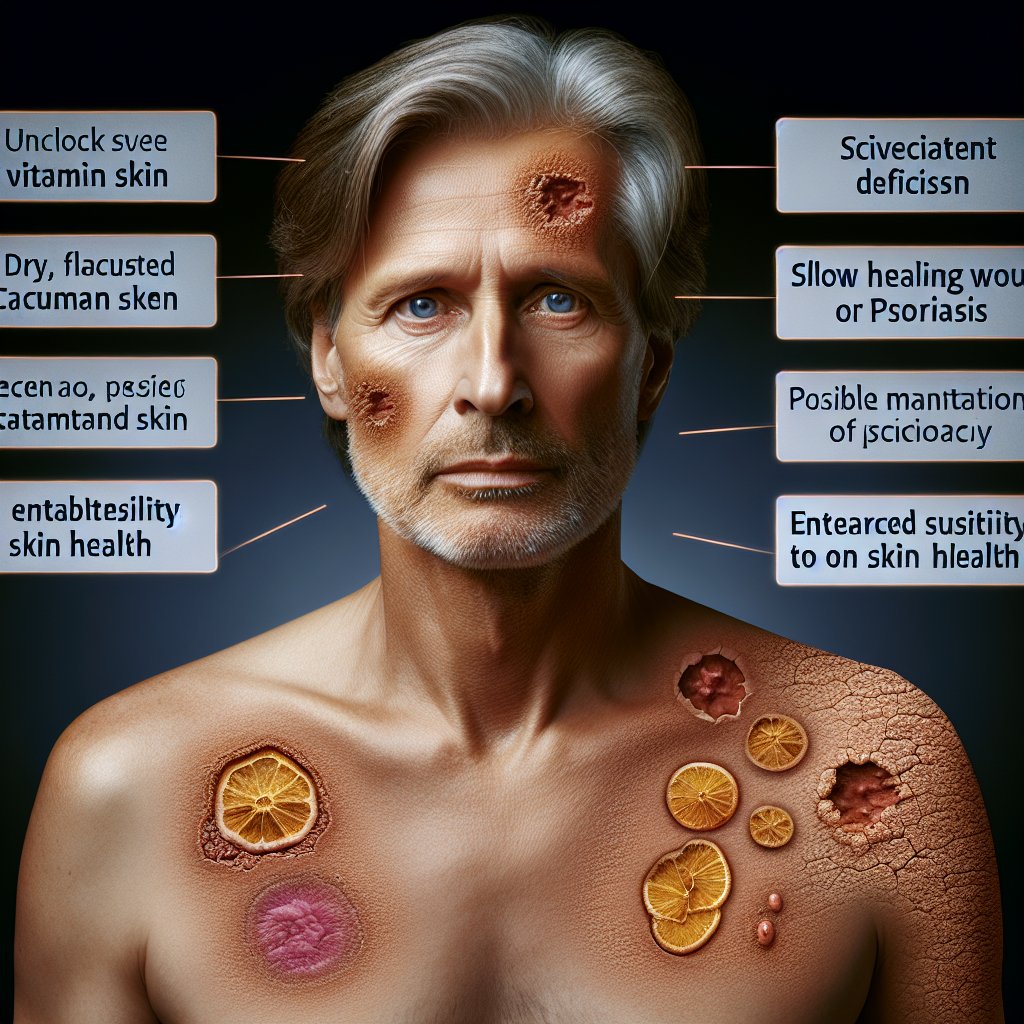Unlock the Secrets: Vitamin D Deficiency and Its Impact on Skin Health Revealed!
Unlock the Secrets: Vitamin D Deficiency and Its Impact on Skin Health Revealed!
Hey there, lovely readers! Today, we’re diving deep into the world of Vitamin D and its incredible impact on our overall health, with a special focus on its connection to skin health. You’ve probably heard about the benefits of this mighty vitamin, but did you know that it plays a pivotal role in maintaining the health and vibrancy of our skin?
Vitamin D, often referred to as the “sunshine vitamin,” is a vital nutrient that our bodies need to function optimally. It is known for its role in maintaining strong bones and supporting our immune system, but its significance goes far beyond that. We now understand that vitamin D deficiency can have a profound impact on our skin health, leading to issues such as dryness, flakiness, and even more serious conditions.
Recent scientific research has shown that insufficient levels of vitamin D are associated with a higher prevalence of skin problems, including eczema, psoriasis, and even premature aging. This revelation has sparked a renewed interest in understanding the link between vitamin D and our skin, prompting health experts to emphasize the importance of maintaining adequate levels of this essential nutrient.

Causes of Vitamin D Deficiency
There are several factors that can contribute to vitamin D deficiency, impacting not only our overall health but also our skin. Let’s take a look at some of the key factors that can lead to a deficiency in this essential vitamin.
Inadequate Sun Exposure
One of the primary sources of vitamin D is natural sunlight. When sunlight hits our skin, it triggers the production of vitamin D. However, factors such as spending more time indoors, using sunscreen, or living in areas with high pollution can limit the amount of sun exposure we receive, thus impacting our vitamin D levels. This deficiency can manifest in various skin issues, highlighting the crucial role of vitamin D in skin health.
Dietary Deficiencies
Our diet plays a significant role in maintaining adequate vitamin D levels. Foods such as fatty fish, egg yolks, and fortified dairy products are essential sources of this vitamin. However, inadequate consumption of these foods, especially in individuals following a strict vegan or vegetarian diet, can lead to deficiencies. This can, in turn, have implications for skin health, making it essential to ensure a well-rounded and balanced diet to support overall health and skin radiance.
Certain Medical Conditions
Some medical conditions or surgeries can affect the body’s ability to absorb vitamin D effectively. For example, individuals with Crohn’s disease, celiac disease, or those who have undergone gastric bypass surgery may have a higher risk of vitamin D deficiency. It’s important to consult with a healthcare professional if you have any concerns about these conditions and their potential impact on vitamin D levels and skin health.
Age
As we age, our skin undergoes changes, and our bodies may become less efficient at producing vitamin D from sunlight. Additionally, older adults may spend more time indoors or in shaded areas, further reducing their sun exposure. This can contribute to lower vitamin D levels, potentially affecting skin health and leading to various skin concerns associated with inadequate vitamin D.
Understanding these factors that contribute to vitamin D deficiency is crucial in addressing and preventing potential implications for skin health. By being mindful of sun exposure, maintaining a balanced diet, addressing any medical conditions, and considering age-related changes, we can take proactive steps to support our skin and overall well-being.
Symptoms of Vitamin D Deficiency on Skin
When it comes to maintaining healthy skin, we often focus on skincare products and routines. However, it’s important to remember that our skin’s health is also influenced by internal factors, such as nutrition and vitamin levels. One crucial vitamin that plays a significant role in skin health is vitamin D. Let’s explore some common signs that may indicate a deficiency in vitamin D, affecting skin health.
Dry Skin
One of the most common signs of vitamin D deficiency on the skin is dryness. Research has shown that low levels of vitamin D can lead to dry, flaky skin, as vitamin D is involved in skin barrier function and hydration. If you find that your skin is consistently dry, it may be worth considering your vitamin D levels.
Slow Wound Healing
Vitamin D deficiency can also impact the body’s ability to heal wounds. If you notice that your cuts, bruises, or other skin injuries are taking longer to heal than usual, it could be a sign that your vitamin D levels are inadequate. Studies have shown that vitamin D plays a crucial role in the wound healing process, promoting skin repair and regeneration.
Psoriasis and Eczema
Psoriasis and eczema are chronic skin conditions that can be influenced by vitamin D levels. Research suggests that low levels of vitamin D may exacerbate the symptoms of these conditions, leading to increased skin inflammation and discomfort. Therefore, ensuring optimal vitamin D levels may contribute to managing the symptoms of psoriasis and eczema.
Increased Risk of Skin Infections
Another symptom of vitamin D deficiency on the skin is an increased susceptibility to skin infections. Vitamin D plays a crucial role in supporting the immune system’s function, including its ability to fight off infections. If you find that you are experiencing frequent or persistent skin infections, it may be worth investigating your vitamin D levels.
Understanding these common signs of vitamin D deficiency on the skin is crucial for maintaining overall skin health. If you recognize any of these symptoms, consulting with a healthcare professional and considering a vitamin D assessment can be a proactive step towards addressing potential deficiencies and supporting your skin’s well-being.

Diagnosis of Vitamin D Deficiency
So, how can you actually find out if you have a Vitamin D deficiency? Well, the answer lies in a simple blood test. This test measures the level of Vitamin D in your body.
The most accurate way to measure how much Vitamin D is circulating in your body is the 25-hydroxy vitamin D blood test. Levels below 20 nanograms per milliliter (ng/mL) indicate a deficiency, while levels between 20 and 30 ng/mL are considered insufficient. The optimal range for overall health and skin benefits is 30-50 ng/mL.
To make sure you’re accurately diagnosed, you should talk to your healthcare provider about your risks and concerns. They may recommend a blood test as well as evaluating your diet, sun exposure, and any symptoms you might be experiencing.
After the test, if it turns out that you are deficient in Vitamin D, there are various ways to address this issue and improve your skin health.
Treatment for Vitamin D Deficiency
So, you’ve discovered that you have a vitamin D deficiency and are wondering what to do next. Don’t worry, there are several options available to help you increase your vitamin D levels and improve your skin health.
Supplementation
One effective way to address vitamin D deficiency is through supplementation. Research suggests that taking vitamin D supplements can significantly raise vitamin D levels in the body. According to a study published in the Journal of the American Academy of Dermatology, vitamin D supplementation has been shown to improve symptoms of skin conditions associated with deficiency, such as eczema and psoriasis, ultimately leading to better skin health.
When choosing a vitamin D supplement, it’s essential to consult with your healthcare provider to determine the appropriate dosage for your specific needs. They can also conduct a blood test to accurately measure your vitamin D levels and recommend a suitable supplement regimen.
Dietary Changes
Another way to combat vitamin D deficiency is by making specific dietary changes. Foods such as fatty fish (salmon, mackerel, and sardines), egg yolks, and fortified dairy products are excellent sources of vitamin D. Including these foods in your diet can help boost your vitamin D levels naturally. Additionally, a study published in the Journal of Investigative Dermatology suggests that a diet rich in vitamin D may contribute to improved skin health, potentially reducing the risk of certain skin conditions.
Consider speaking with a nutritionist or registered dietitian who can assist you in creating a meal plan that incorporates vitamin D-rich foods to support your overall skin health.
Sunlight Exposure Recommendations
Exposing your skin to sunlight is one of the most natural ways to increase vitamin D levels. When the skin is exposed to sunlight, it produces vitamin D. However, it’s essential to strike a balance between reaping the benefits of sunlight exposure for vitamin D synthesis and protecting your skin from potential sun damage.
Experts recommend spending about 10-30 minutes in the sun without sunscreen a few times a week, depending on your skin type, the time of day, and the UV index. It’s crucial to practice sun safety to prevent sunburn and minimize the risk of skin cancer. Always remember to apply sunscreen after the recommended sun exposure time.
By incorporating supplementation, dietary changes, and responsible sunlight exposure into your daily routine, you can effectively address vitamin D deficiency and support your journey to healthy and radiant skin.

Prevention of Vitamin D Deficiency
So, how can you ensure that you maintain adequate levels of Vitamin D and prevent Vitamin D deficiency, all while keeping your skin healthy and glowing? Here are some strategies to consider:
Sun Exposure
One of the most natural ways to boost your Vitamin D levels is through safe sun exposure. When UVB rays from the sun hit the skin, a reaction takes place, resulting in the production of Vitamin D. Aim for 10-30 minutes of midday sun exposure at least twice a week, being mindful of the recommended sun exposure times in your region to avoid sunburn. It’s essential to strike a balance, as overexposure to the sun can lead to skin damage.
Diet
Your diet plays a crucial role in maintaining adequate levels of Vitamin D. Fatty fish such as salmon, mackerel, and tuna are fantastic sources of Vitamin D. Other options include cheese, egg yolks, and fortified foods like orange juice and breakfast cereals. Incorporating these foods into your diet can significantly contribute to your Vitamin D intake.
Possible Supplements
In some cases, especially for individuals with limited sun exposure or specific medical conditions, Vitamin D supplements might be necessary. Consulting with a healthcare professional and getting a blood test to determine your Vitamin D levels can help you understand if supplementation is required. It’s essential never to self-prescribe supplements and always seek professional advice.
By being mindful of these strategies and implementing them into your routine, you can take proactive steps towards maintaining adequate Vitamin D levels, promoting overall health, and keeping your skin radiant and healthy.
In conclusion, prioritizing sun exposure, incorporating Vitamin D-rich foods into your diet, and seeking professional advice regarding supplementation can help you prevent Vitamin D deficiency and support your overall skin health.
Impact of Vitamin D on Skin Health
When it comes to maintaining healthy skin, we often think about external skincare routines and products. However, the role of internal factors, such as nutrition and vitamin levels, should not be overlooked. Vitamin D, often referred to as the “sunshine vitamin,” plays a crucial role in skin health that goes beyond just bone strength and immune function.
Vitamin D and Skin Cell Growth
Research has shown that vitamin D is involved in skin cell growth, repair, and metabolism. Adequate levels of vitamin D promote the differentiation of keratinocytes, the predominant cells in the epidermis, which is the outermost layer of the skin. This process helps in maintaining the overall integrity and function of the skin barrier.
Vitamin D’s Anti-inflammatory Functions
Vitamin D also exhibits anti-inflammatory effects in the skin. It can help in managing various skin conditions linked to inflammation, such as acne, eczema, and psoriasis. Studies have suggested that vitamin D may modulate the immune system response in the skin, thereby reducing inflammatory processes that contribute to skin disorders.
The Overall Skin Condition and Vitamin D
Furthermore, vitamin D is known to play a role in enhancing the skin’s overall condition. It may help in protecting against environmental stressors and UV-induced damage, which are pivotal factors in premature skin aging. Maintaining sufficient levels of vitamin D can contribute to a radiant and healthy complexion.
Therefore, ensuring that you have adequate vitamin D levels is essential for supporting skin cell growth, repair, anti-inflammatory functions, and overall skin condition.

Importance of Consulting a Healthcare Professional
If you suspect that you may have a vitamin D deficiency that is impacting your skin health, it is essential to consult with a healthcare professional. While the signs and symptoms of vitamin D deficiency can often be subtle, a healthcare provider can accurately diagnose, treat, and monitor your vitamin D levels. This is crucial since low levels of vitamin D have been linked to various skin conditions such as psoriasis, eczema, and acne.
Medical professionals have the expertise to conduct the necessary tests to determine your vitamin D levels accurately. They will provide personalized recommendations based on your specific health status, including any underlying conditions or medications that may affect vitamin D absorption or metabolism.
Furthermore, seeking medical advice ensures that you receive appropriate treatment for any diagnosed vitamin D deficiency. This may involve supplementation, dietary adjustments, and lifestyle modifications tailored to your individual needs. Regular monitoring by a healthcare professional can also help track your progress and make any necessary adjustments to your vitamin D regimen.
Remember, when it comes to your health, it’s always best to seek guidance from qualified professionals who can provide personalized care and support.
Conclusion: The Impact of Vitamin D Deficiency on Skin Health
Throughout this article, we’ve delved into the fascinating world of Vitamin D and its crucial role in maintaining healthy skin. Research has consistently shown that Vitamin D deficiency can have a profound impact on our skin health, leading to various conditions and concerns. By addressing this deficiency, we can unlock the secrets to healthy, radiant skin.
Summarizing the Key Points
We’ve learned that Vitamin D plays a pivotal role in skin health by promoting cell growth, repair, and metabolism. Its anti-inflammatory properties make it essential in managing skin conditions such as acne, eczema, psoriasis, and even premature aging. Moreover, studies have linked adequate Vitamin D levels to a reduced risk of skin cancer, showcasing its protective benefits.
Furthermore, we’ve explored how Vitamin D deficiency is alarmingly widespread, especially among women, and how modern lifestyles, including reduced sun exposure and dietary choices, contribute to this issue. Understanding the symptoms of deficiency, such as dry skin, slow wound healing, and increased sensitivity, empowers us to take proactive measures to address it.
The Importance of Addressing Vitamin D Deficiency for Skin Health
Addressing Vitamin D deficiency is not just about maintaining healthy skin; it’s about embracing overall well-being. By optimizing our Vitamin D levels, we can support our immune system, bone health, and mental wellness. However, when it comes to our skin, the benefits are particularly noticeable. Improved skin hydration, reduced inflammation, and better protection against UV radiation are just some of the ways Vitamin D contributes to a radiant complexion.
It’s clear that taking steps to address Vitamin D deficiency directly impacts our skin’s resilience, appearance, and long-term health. Whether through sensible sun exposure, supplements, or incorporating Vitamin D-rich foods into our diet, we hold the key to nurturing our skin from within. Let’s unlock the power of Vitamin D and unleash our skin’s natural, vibrant beauty.


